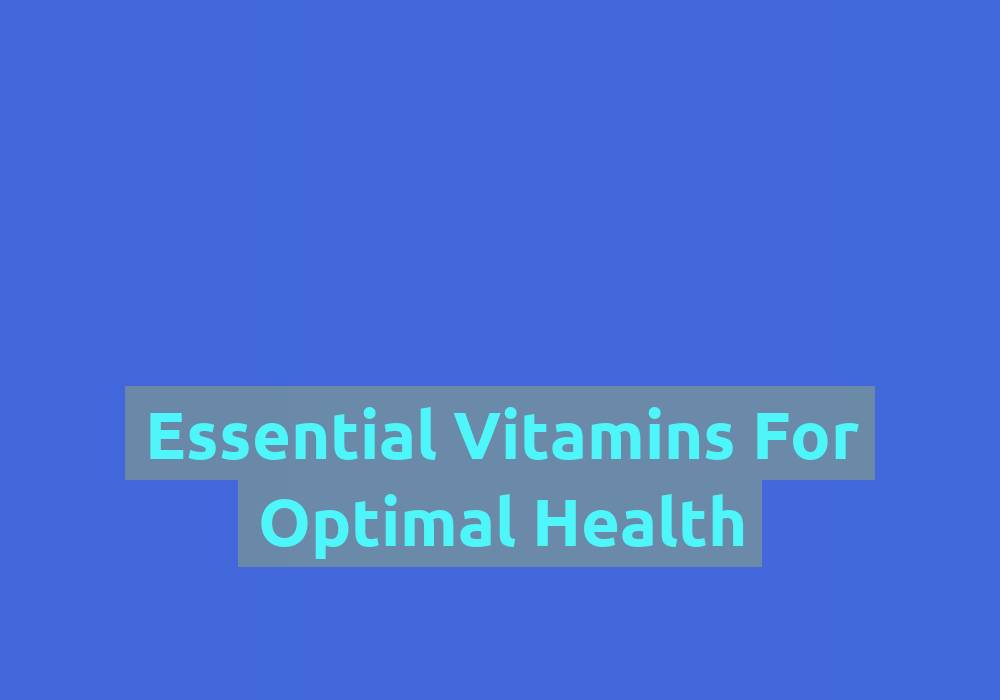Essential Vitamins for Optimal Health

Ensuring the intake of essential vitamins is crucial for maintaining optimal health. These vital nutrients play a vital role in various bodily functions, including metabolism, immune system support, and overall well-being. In this article, we will discuss some of the essential vitamins that are necessary for maintaining good health.
Vitamin A
Vitamin A is a fat-soluble vitamin that plays a critical role in maintaining healthy vision, promoting proper growth and development, and supporting immune function. It is also essential for the health of our skin and mucous membranes. This crucial vitamin can be obtained from both animal and plant sources.
Some benefits of Vitamin A include:
- Vision Support: Vitamin A is necessary for the proper functioning of the retina and helps maintain good vision, especially in low light conditions.
- Growth and Development: Vitamin A is vital for the growth and development of cells and tissues, making it especially important for children and pregnant women.
- Immune Function: It enhances the immune system by supporting the production and function of white blood cells, which help fight off infections.
- Skin Health: Vitamin A promotes the production of collagen, a protein that keeps the skin firm and healthy, and helps prevent the occurrence of skin problems like acne and dryness.
Sources of Vitamin A: Carrots, sweet potatoes, leafy green vegetables (such as spinach and kale), and liver are excellent sources of vitamin A. Consuming these foods can help ensure an adequate intake of this essential vitamin.
Vitamin B
The vitamin B complex consists of several vitamins, including B1 (thiamine), B2 (riboflavin), B3 (niacin), B5 (pantothenic acid), B6 (pyridoxine), B7 (biotin), B9 (folate), and B12 (cobalamin). These vitamins are involved in energy production, brain function, the formation of red blood cells, and the maintenance of a healthy nervous system.
- Energy Production: B vitamins are essential for converting carbohydrates into energy, providing fuel for the body’s daily activities and functions.
- Brain Function: They play a crucial role in maintaining proper brain function, including memory, concentration, and mood regulation.
- Red Blood Cell Formation: B vitamins are necessary for the production of red blood cells, which carry oxygen throughout the body. Adequate intake of B vitamins helps prevent anemia.
- Nervous System Health: These vitamins support the health and proper functioning of the nervous system, including the transmission of signals between the brain and other parts of the body.
Sources of Vitamin B: Consuming a variety of foods can help ensure adequate intake of vitamin B. Whole grains, legumes, nuts, seeds, dairy products, meat, fish, and leafy green vegetables are all excellent sources of different B vitamins. For example:
- B1 (thiamine) can be found in whole grains, legumes, and nuts.
- B2 (riboflavin) is abundant in dairy products, leafy green vegetables, and lean meats.
- B3 (niacin) is found in meat, fish, and whole grains.
- B6 (pyridoxine) can be obtained from poultry, fish, potatoes, and bananas.
- B9 (folate) is present in leafy green vegetables, legumes, and citrus fruits.
- B12 (cobalamin) is primarily found in animal-based foods like meat, fish, eggs, and dairy products.
Vitamin C
Vitamin C, also known as ascorbic acid, is a powerful antioxidant that supports immune function, collagen production, and wound healing. It also aids in the absorption of iron and protects cells from damage caused by free radicals.
Benefits of Vitamin C:
- Immune Support: Vitamin C enhances the function of various immune cells, helping the body fight off infections and diseases.
- Collagen Production: It plays a crucial role in the synthesis of collagen, a protein that is essential for the health and structure of skin, bones, tendons, and blood vessels.
- Wound Healing: Vitamin C promotes the formation of connective tissue, which aids in wound healing and tissue repair.
- Antioxidant Protection: As an antioxidant, vitamin C helps neutralize harmful free radicals and protect cells from oxidative stress.
Sources of Vitamin C: Citrus fruits (such as oranges and grapefruits), strawberries, kiwi, bell peppers, and broccoli are rich sources of vitamin C. Adding these fruits and vegetables to your diet can ensure an adequate intake of this essential vitamin.
Vitamin D
Vitamin D is unique as it can be synthesized by our bodies when our skin is exposed to sunlight. It plays a crucial role in bone health, as it helps in the absorption of calcium and phosphorus. Additionally, vitamin D is involved in immune function, muscle function, and overall well-being.
Benefits of Vitamin D:
- Bone Health: Vitamin D works together with calcium to maintain strong and healthy bones, reducing the risk of fractures and osteoporosis.
- Immune Function: It supports the immune system by enhancing the function of immune cells and reducing inflammation.
- Muscle Function: Vitamin D is necessary for proper muscle function and can help prevent muscle weakness and pain.
- Overall Well-being: Adequate levels of vitamin D have been associated with improved mood and overall well-being.
Sources of Vitamin D: While sunlight exposure is the primary source of vitamin D, dietary sources include fatty fish (such as salmon and mackerel), eggs, and fortified foods like milk and cereals. Including these foods in your diet can help maintain optimal vitamin D levels.
Vitamin E
Vitamin E is a fat-soluble vitamin that acts as an antioxidant, protecting cells from damage caused by free radicals. It supports healthy immune function, skin health, and promotes the formation of red blood cells.
Benefits of Vitamin E:
- Antioxidant Protection: Vitamin E protects cell membranes from oxidative damage and reduces the risk of chronic diseases associated with inflammation.
- Immune Support: It enhances the body’s immune response, helping to fight off infections and maintain overall health.
- Skin Health: Vitamin E is known for its skin benefits, including moisturizing, anti-aging, and wound healing properties.
- Red Blood Cell Formation: This vitamin aids in the production of red blood cells, ensuring proper oxygen transport throughout the body.
Sources of Vitamin E: Nuts (such as almonds and peanuts), seeds (such as sunflower seeds), vegetable oils (such as sunflower oil and olive oil), and leafy green vegetables (such as spinach and broccoli) are excellent sources of vitamin E. Including these foods in your diet can help meet your vitamin E requirements.
Vitamin K
Vitamin K is essential for blood clotting and proper bone health. It helps in the synthesis of proteins that regulate blood clotting and contributes to bone mineralization.
Benefits of Vitamin K:
- Blood Clotting: Vitamin K plays a crucial role in the coagulation process, helping wounds heal and preventing excessive bleeding.
- Bone Health: It contributes to bone mineralization and helps maintain bone density, reducing the risk of fractures and osteoporosis.
- Heart Health: Emerging research suggests that vitamin K may play a role in cardiovascular health by reducing the risk of arterial calcification.
Sources of Vitamin K: Leafy green vegetables (such as kale, spinach, and broccoli), Brussels sprouts, and fermented foods like natto are good sources of vitamin K. Including these foods in your diet can help ensure an adequate intake of this essential vitamin.
Conclusion
Incorporating a variety of foods into your diet that are rich in essential vitamins is essential for maintaining optimal health. The vitamins mentioned in this article, such as vitamin A, B complex, C, D, E, and K, play crucial roles in various bodily functions and support overall well-being. Remember to consult with a healthcare professional or a registered dietitian to ensure you are meeting your specific vitamin needs. By prioritizing a balanced diet that includes these essential vitamins, you can support your body’s overall health and vitality.
FAQ
1. What are the benefits of Vitamin A?
- Vision Support: Vitamin A is necessary for the proper functioning of the retina and helps maintain good vision, especially in low light conditions.
- Growth and Development: Vitamin A is vital for the growth and development of cells and tissues, making it especially important for children and pregnant women.
- Immune Function: It enhances the immune system by supporting the production and function of white blood cells, which help fight off infections.
- Skin Health: Vitamin A promotes the production of collagen, a protein that keeps the skin firm and healthy, and helps prevent the occurrence of skin problems like acne and dryness.
2. What are the sources of Vitamin A?
- Carrots, sweet potatoes, leafy green vegetables (such as spinach and kale), and liver are excellent sources of vitamin A.
3. What are the benefits of Vitamin B?
- Energy Production: B vitamins are essential for converting carbohydrates into energy, providing fuel for the body’s daily activities and functions.
- Brain Function: They play a crucial role in maintaining proper brain function, including memory, concentration, and mood regulation.
- Red Blood Cell Formation: B vitamins are necessary for the production of red blood cells, which carry oxygen throughout the body. Adequate intake of B vitamins helps prevent anemia.
- Nervous System Health: These vitamins support the health and proper functioning of the nervous system, including the transmission of signals between the brain and other parts of the body.
4. What are the sources of Vitamin B?
- Whole grains, legumes, nuts, seeds, dairy products, meat, fish, and leafy green vegetables are all excellent sources of different B vitamins.
